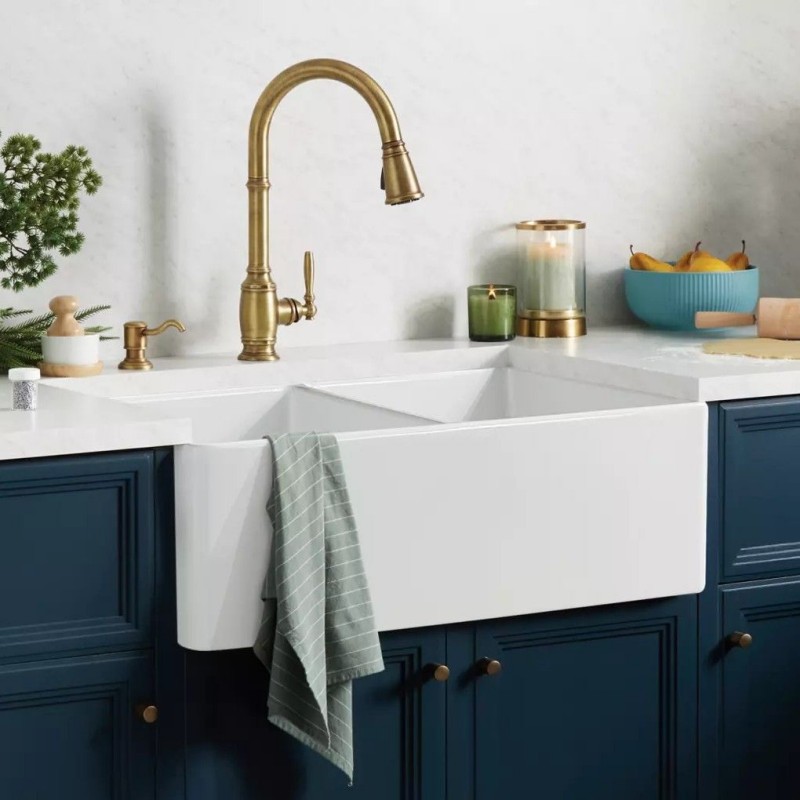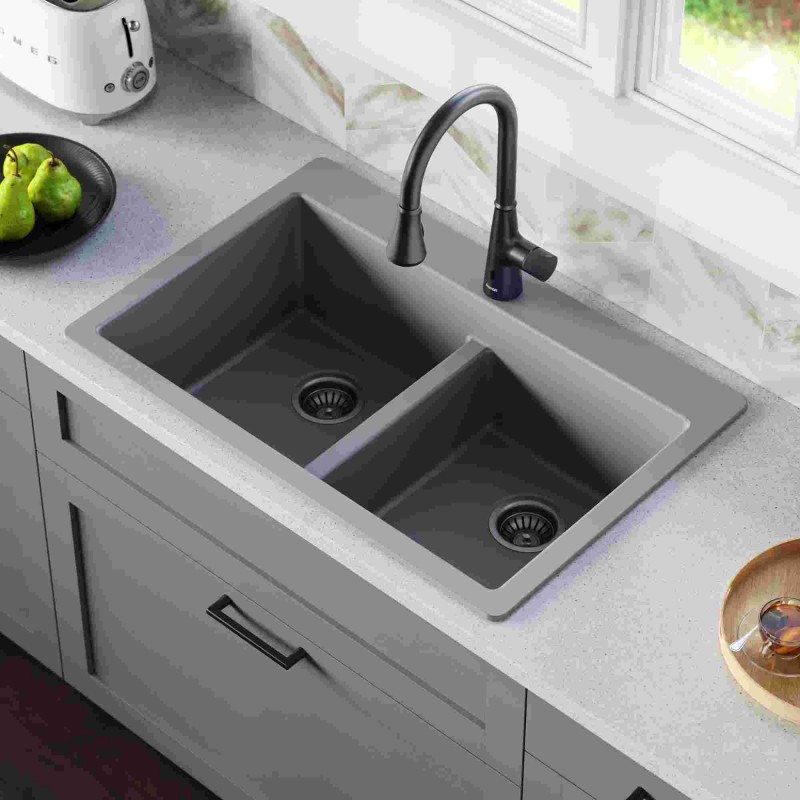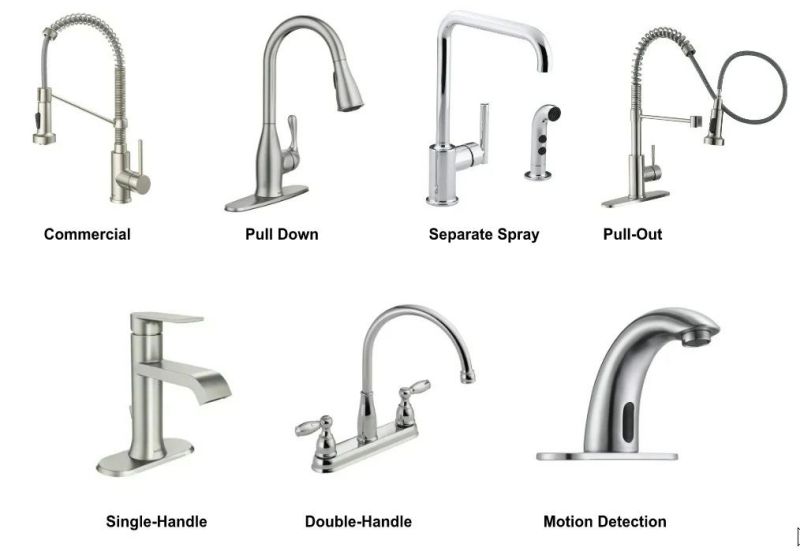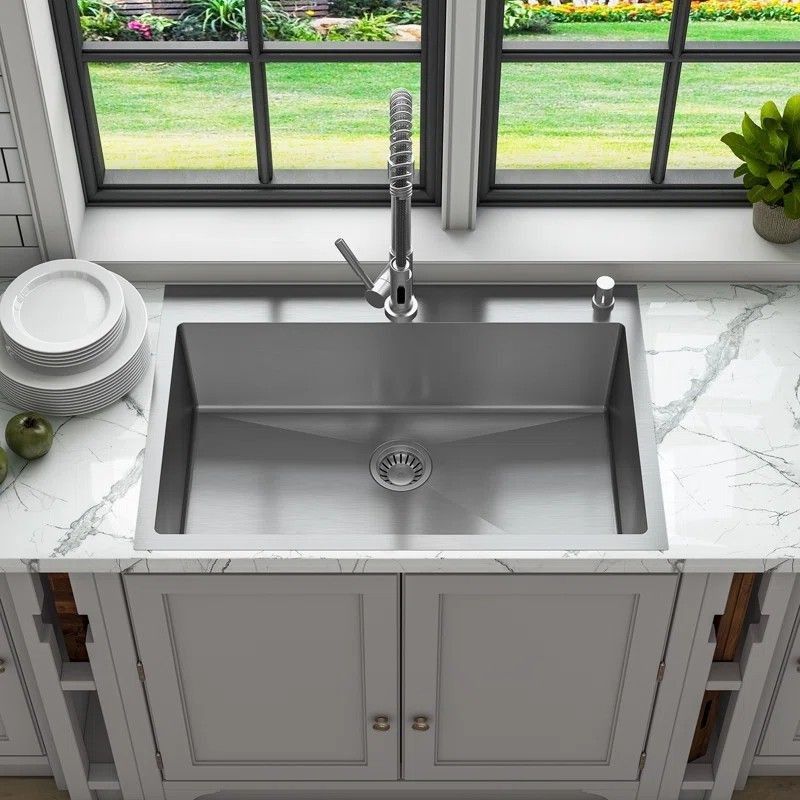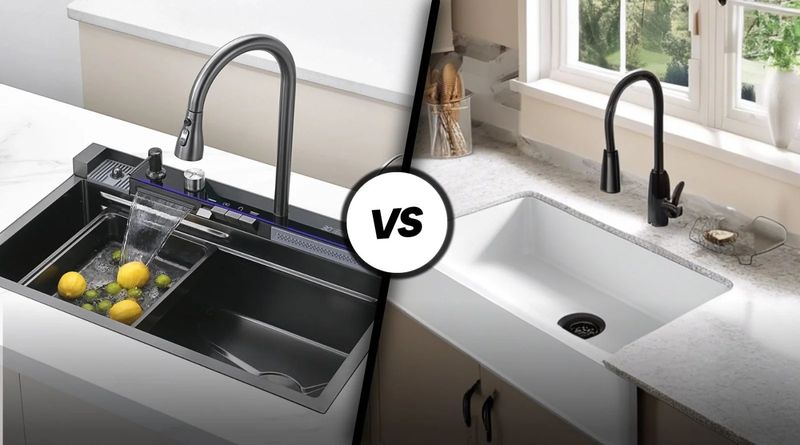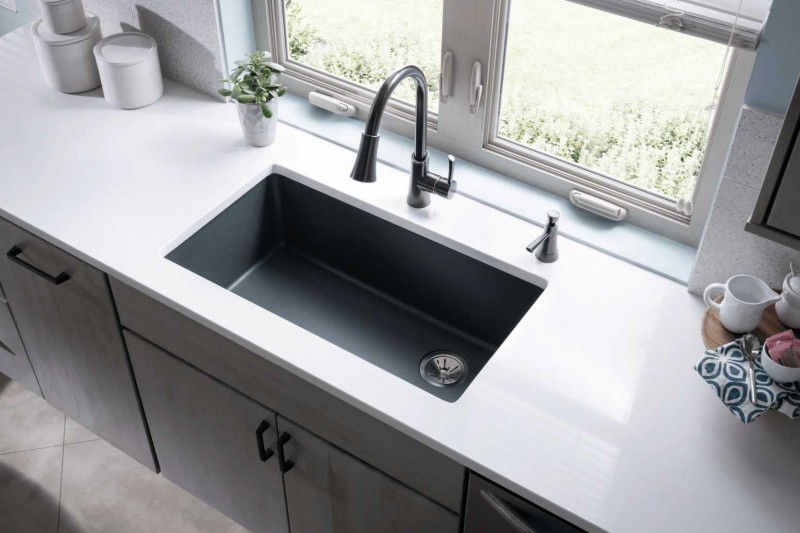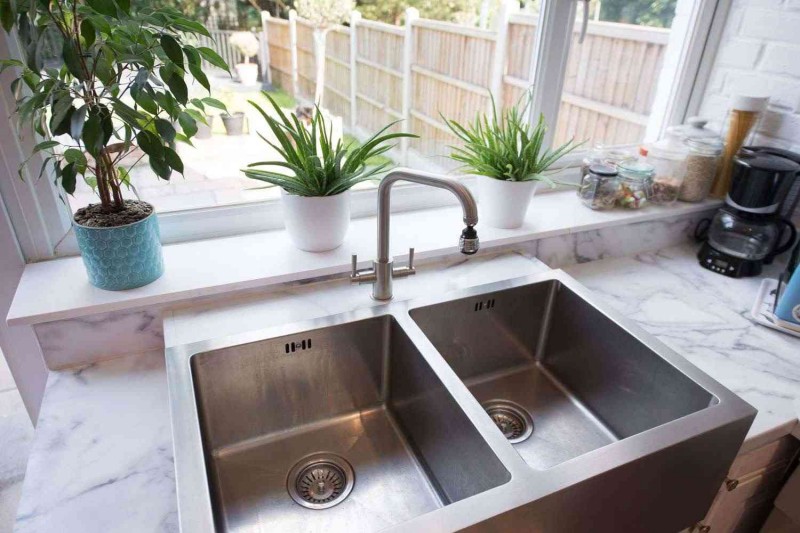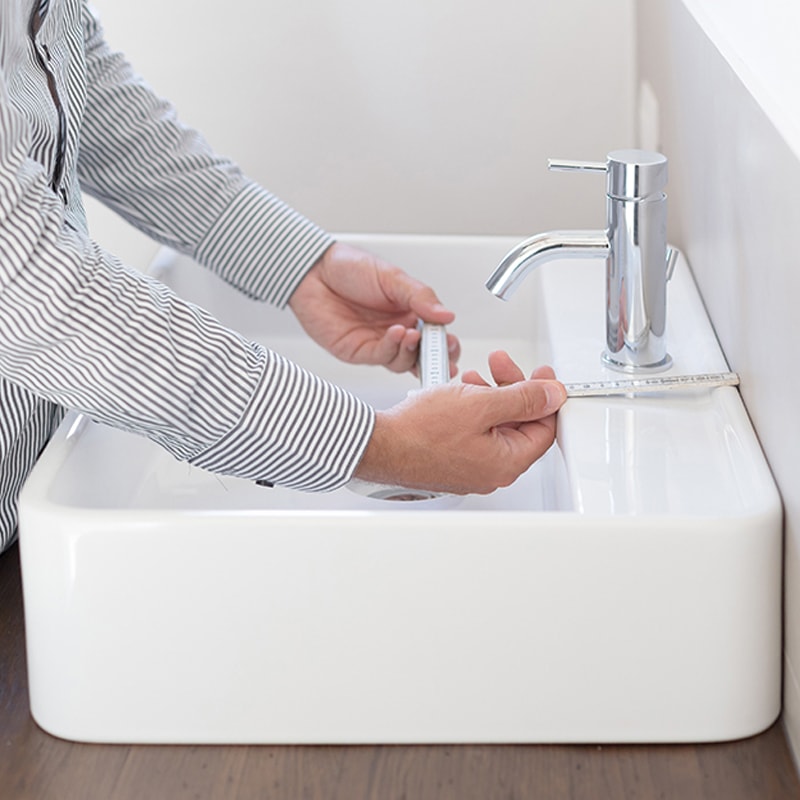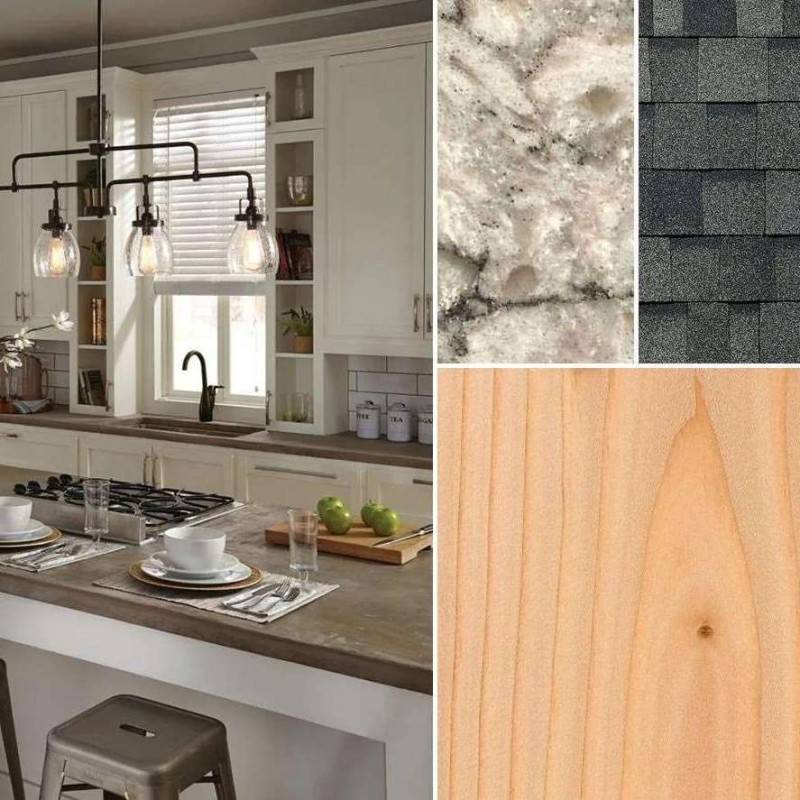 English
English
Jabra Sanitary is a sanitaryware supplier offering toilets, sinks, faucets, bathtubs, etc., at competitive prices. If you're a distributor, wholesaler, or project contractor, get a quote today!
 $23.9 Limited-time Offer
$23.9 Limited-time Offer Consignment Policy
Consignment Policy 20 Years of Experience
20 Years of Experience
The kitchen sink is one of the most frequently used fixtures in any home, making it essential to choose one that meets both practical needs and aesthetic preferences. When it comes to selecting the right material, homeowners often find themselves deciding between two popular options: quartz and stainless steel.
Each material brings its own set of advantages and disadvantages, influencing factors such as durability, maintenance, heat resistance, and cost. Whether you're renovating your kitchen or designing a new one, understanding the differences between these sink materials can help you make an informed decision that aligns with your lifestyle, budget, and design goals.
In this comprehensive guide, we'll explore the key features, benefits, and drawbacks of quartz and stainless steel sinks to help you determine the best fit for your kitchen, whether you prefer a quartz kitchen sink vs stainless steel.
Table of Contents
What is Quartz Material?
Quartz Sinks Pros and Cons
What is Stainless Steel Material?
Stainless Steel Sinks Pros and Cons
Quartz Sink Vs. Stainless Steel Sink
Which is Better: Quartz or Stainless Steel Kitchen Sink?
FAQs
Conclusion
What is Quartz Material?
Quartz is a natural mineral that is widely used in kitchen design due to its durability and elegant appearance. It is typically engineered with resin to form a composite material, resulting in a smooth, non-porous surface that resists scratches, stains, and bacterial growth.
Quartz is known for its natural stone-like look, making it a popular choice for countertops, flooring, and sinks. The material's strong and dense nature makes it an excellent option for homeowners seeking a sink that combines functionality with a luxurious feel, especially for those considering a granite quartz sink vs stainless steel.
Quartz Sinks Pros and Cons
Quartz sinks are a popular choice among homeowners who value a blend of durability and aesthetics. These sinks are created by combining natural quartz particles with acrylic resin, making them stronger than natural stone while offering a seamless, glossy finish.
Available in a variety of colors and styles, quartz sinks add an element of sophistication to kitchen designs. This makes them ideal for those weighing the pros and cons of quartz sinks and wondering if quartz sinks are durable enough for their needs.
Pros
- Durability: The composite structure of quartz sinks makes them exceptionally durable, able to withstand daily use without showing significant wear and tear. This is one of the key quartz kitchen sinks pros and cons to consider.
- Aesthetic Appeal: The stone-like appearance of quartz adds a luxurious and refined touch to kitchen designs, making it a popular choice for modern kitchens when comparing quartz vs stainless steel kitchen sinks.
- Stain Resistance: The non-porous surface of quartz prevents common kitchen stains from seeping in, maintaining the sink's original color and finish over time. This feature is particularly beneficial when choosing between quartz composite sink vs stainless steel.
- Sound Insulation: Quartz sinks offer superior sound absorption, reducing the noise of running water, clattering dishes, and heavy cookware, unlike metal sinks.
- Heat Resistance: Quartz is highly resistant to heat, making it safe to place hot pots and pans directly in the sink without worrying about heat damage, a significant factor in the quartz sink vs stainless steel debate.
Cons
- Heavyweight: Due to their dense material, quartz sinks are significantly heavier than stainless steel, requiring reinforced cabinetry or professional installation. This is important to consider when deciding between stainless steel or quartz sinks.
- Prone to Chipping or Cracking: While quartz is generally durable, it can chip or crack upon impact with heavy or sharp objects. This is one of the quartz sinks pros cons that might make homeowners consider other materials.
- Requires Sealing: Some quartz sinks may require occasional sealing to maintain their non-porous surface and to prevent long-term staining.
- Limited Color Options: While there are several color variations, quartz sinks are less flexible in terms of color compared to painted or polished stainless steel finishes, a consideration when comparing quartz vs steel sink options.
What is Stainless Steel Material?
Stainless steel is an alloy composed primarily of iron, chromium, and other metals, which gives it its distinct durability and corrosion resistance. It has long been a preferred material for kitchen sinks due to its lightweight, cost-effectiveness, and sleek, modern look.
Stainless steel is known for its antibacterial properties, making it a hygienic choice for food preparation areas. Its polished metallic finish adds a clean, industrial feel to both traditional and contemporary kitchens. This versatility often makes stainless steel sinks a top choice in the stainless steel sink vs quartz comparison.
Stainless Steel Sinks Pros and Cons
Stainless steel sinks are favored by homeowners for their affordability, ease of installation, and long-lasting performance. The material's composition offers good rust resistance and makes it adaptable to various kitchen designs, from industrial to minimalist styles.
The versatile nature of stainless steel allows for a wide range of sizes, shapes, and depths, catering to different kitchen needs, and it's an important consideration in the quartz sink vs stainless steel sink comparison.
Pros
- Lightweight: Stainless steel sinks are lightweight, which not only makes installation easier but also reduces the need for additional countertop support, a notable benefit in the composite vs stainless sink debate.
- Affordable: These sinks are generally more budget-friendly compared to quartz, making them a cost-effective choice for kitchen renovations.
- Rust-Resistant: The presence of chromium in stainless steel gives it excellent resistance to rust and corrosion, even when exposed to moisture over extended periods.
- Easy to Clean and Maintain: Stainless steel surfaces can be cleaned easily with soap and water, and they don't require sealing or special cleaners, a point of advantage in the stainless steel vs quartz sink comparison.
- Hygienic: The non-porous surface of stainless steel prevents bacteria buildup, making it a sanitary option for kitchen sinks, which is a key benefit when comparing quartz vs stainless sinks.
Cons
- Susceptible to Scratches: Stainless steel can scratch easily, especially when using abrasive cleaning tools or cleaning powders. This is a downside in the stainless steel sinks pros and cons list.
- Noisy: Stainless steel sinks can be noisier than quartz when washing dishes, as they do not offer sound insulation.
- Limited Color Options: Stainless steel typically comes in a silver metallic finish, limiting customization in terms of color, which might sway homeowners in the quartz kitchen sink vs stainless steel decision.
- Water Spots and Fingerprints: These sinks are prone to showing water spots and fingerprints, requiring frequent wiping to maintain a clean appearance.
Quartz Sink Vs. Stainless Steel Sink
When deciding between quartz and stainless steel sinks, it's important to consider factors such as durability, maintenance, heat resistance, and aesthetics. Both materials offer distinct benefits and cater to different kitchen needs, whether you're looking for a modern, luxurious feel or a practical, budget-friendly solution.
Quartz sinks, with their natural stone-like appearance and durability, add an elegant touch to any kitchen. On the other hand, stainless steel sinks are known for their affordability, ease of cleaning, and timeless appeal.
This section will dive into a detailed comparison of these two popular kitchen sink materials, helping you make an informed choice based on your preferences and kitchen requirements, particularly when comparing quartz vs stainless steel kitchen sink choices.
Versatility
Quartz sinks are available in a wider range of colors, textures, and designs, making them more adaptable to modern kitchen aesthetics. The seamless look of quartz adds a natural elegance to kitchens, complementing various design themes.
Stainless steel, while limited to metallic shades, offers timeless appeal and suits both traditional and contemporary kitchens. It is versatile in terms of shape and size, fitting well in small or large spaces. These factors are important to keep in mind when considering quartz sink vs stainless steel sink options.
Durability
Quartz sinks generally offer better durability than stainless steel. They resist scratches, chipping, and fading better than stainless steel, which can dent or scratch with heavy use.
Stainless steel sinks, however, have a longer lifespan in terms of resistance to rust and corrosion, making them a solid option for high-moisture kitchens. This is a critical comparison in the quartz vs stainless sink debate.
Scratch and Dent Resistance
Quartz sinks excel in resisting scratches and dents due to their composite material, which is more impact-resistant than stainless steel.
Stainless steel, especially thinner gauges, can show visible dents or scratches when struck by heavy kitchenware. However, high-gauge (thicker) stainless steel is less prone to denting and offers better protection, making it a consideration in stainless steel sink vs quartz sink decisions.
Heat Resistance
Both quartz and stainless steel offer good heat resistance, but quartz can handle higher temperatures more effectively without warping or discoloration.
Stainless steel, while heat-resistant, can lose its sheen or develop discoloration when exposed to extreme temperatures for prolonged periods. This factor plays a significant role when deciding between a stainless steel or quartz sink.
Ease of Installation
Stainless steel sinks are easier to install due to their lighter weight, making them suitable for a wider range of countertop materials without additional structural support.
Quartz sinks, being heavier, often require professional installation and reinforced cabinetry to accommodate the added weight. This is important to note in the quartz vs stainless steel sink comparison, especially during kitchen renovations.
Maintenance
Quartz sinks require moderate maintenance, with occasional sealing needed to preserve their non-porous surface. Regular kitchen sink cleaning with non-abrasive cleaners helps maintain their appearance.
Stainless steel sinks are low-maintenance, requiring simple cleaning with soap and water. However, they may need regular wiping to prevent water spots or fingerprints. These are key factors in the quartz composite sink vs stainless steel comparison.
Hygienic
Both quartz and stainless steel sinks offer hygienic surfaces, but they have different strengths. Quartz sinks, being non-porous, resist bacterial growth and mold, providing a clean and hygienic workspace.
However, if they are not sealed properly over time, the surface could become more susceptible to contamination. On the other hand, stainless steel sinks are naturally hygienic due to their non-porous nature, ease of cleaning, and resistance to bacteria.
They do not require sealing, making them an excellent choice for kitchens prioritizing sanitation. This makes the quartz vs stainless steel sink comparison critical in areas with high hygiene standards.
Price
Stainless steel sinks are generally more affordable, making them a popular choice for budget-conscious renovations.
Quartz sinks, while more expensive, offer superior durability, aesthetics, and heat resistance, making them a worthwhile investment for long-term use. This price factor is crucial when weighing the pros and cons of quartz sinks or stainless steel.
Which is Better: Quartz or Stainless Steel Kitchen Sink?
Choosing between a quartz and stainless steel sink largely depends on your priorities and kitchen needs. If you're looking for a luxurious, durable option with a natural stone appearance, quartz sinks may be the better fit.
They provide a beautiful finish, excellent heat resistance, and better scratch protection. However, quartz sinks come with a higher price tag and may require more careful maintenance.
On the other hand, stainless steel sinks are ideal for those who prioritize affordability, ease of installation, and low-maintenance care. Stainless steel is lightweight, rust-resistant, and easy to clean, but may show water spots and scratches over time.
Ultimately, the best choice depends on your kitchen's design, your budget, and how much maintenance you're willing to commit to. This is the main decision to make when comparing quartz vs stainless steel kitchen sink options.
FAQs
Can stainless steel sinks rust?
No, stainless steel sinks are designed to be rust-resistant due to their chromium content. However, poor-quality stainless steel or prolonged exposure to moisture and certain harsh chemicals may result in some corrosion over time, though this is rare.
Does a quartz sink need to be sealed?
Some quartz sinks may require occasional sealing, particularly those with resin composite materials. Sealing helps maintain the non-porous surface and prevents stains or bacteria buildup.
Are quartz sinks prone to staining?
Quartz sinks are generally resistant to stains due to their non-porous surface. However, spills like coffee, wine, or food acids should be cleaned promptly to avoid any long-term discoloration.
How much time does it take for a quartz sink to fade in color?
Quartz sinks are highly resistant to fading. With proper care and maintenance, their color can remain intact for many years. However, prolonged exposure to strong sunlight or harsh chemicals could potentially cause slight fading over time.
Is a quartz sink best for glass utensils?
Quartz sinks provide a softer surface than stainless steel, which can help protect glassware from chipping or breaking. Their sound-insulating properties also make them a good choice for those who frequently use delicate glass items.
Are black quartz sinks better than any other colored quartz sink?
Black quartz sinks are highly popular for their modern and sleek appearance. They tend to hide stains and water spots better than lighter colors. However, the performance and durability are the same across all color options for quartz sinks.
Conclusion
Both quartz and stainless steel sinks offer excellent options for different types of kitchens. Quartz sinks stand out for their luxurious look, heat resistance, and scratch durability, making them ideal for modern kitchens seeking a refined aesthetic.
Stainless steel sinks, with their affordability, low-maintenance care, and durability, are perfect for busy kitchens prioritizing functionality and ease of use. Ultimately, the right choice depends on your specific needs, budget, and design preferences.
Not only do we offer kitchen sinks, but we also provide high-quality kitchen faucets. Click here to learn how to replace your kitchen sink faucet easily and efficiently.







